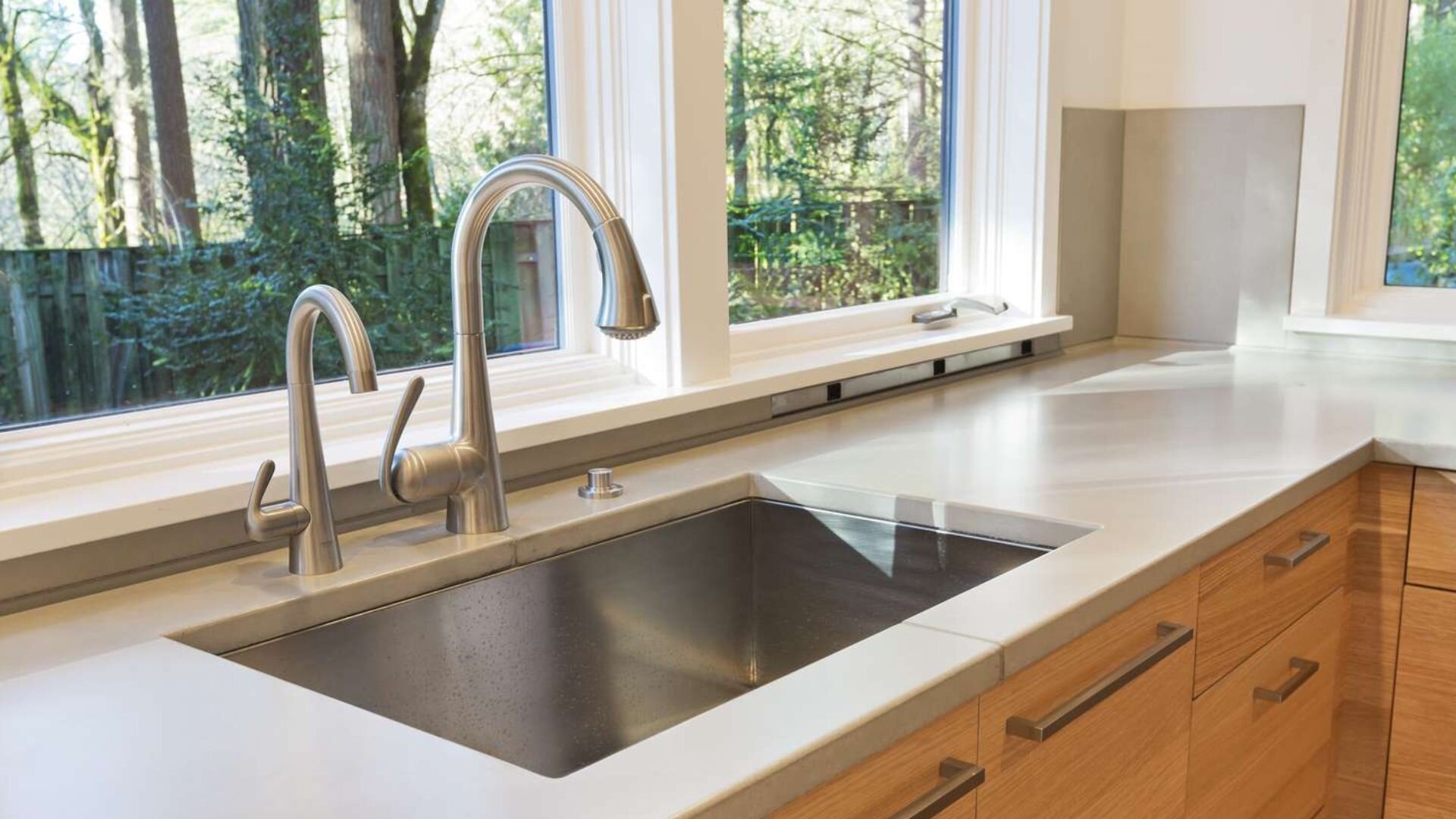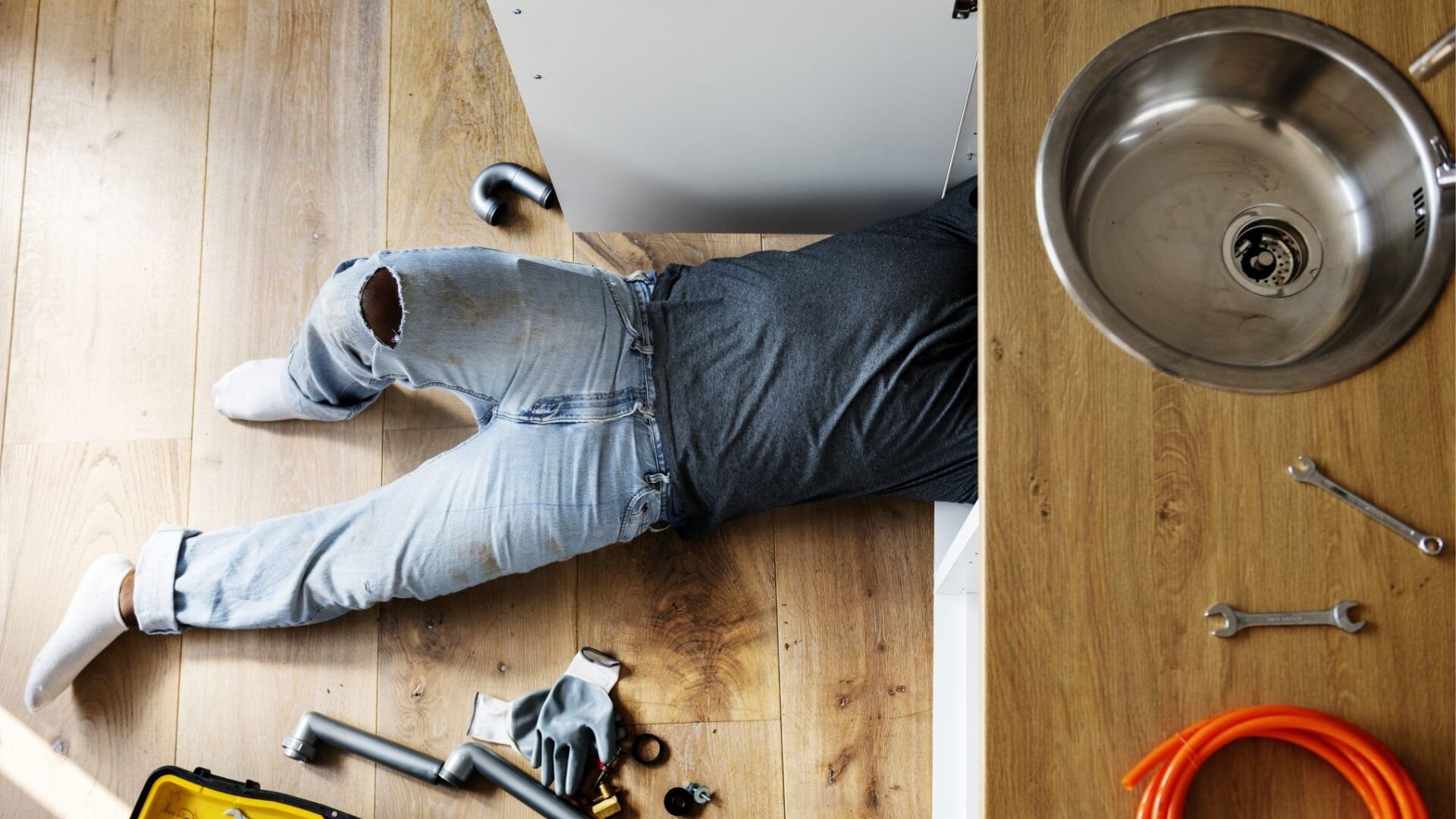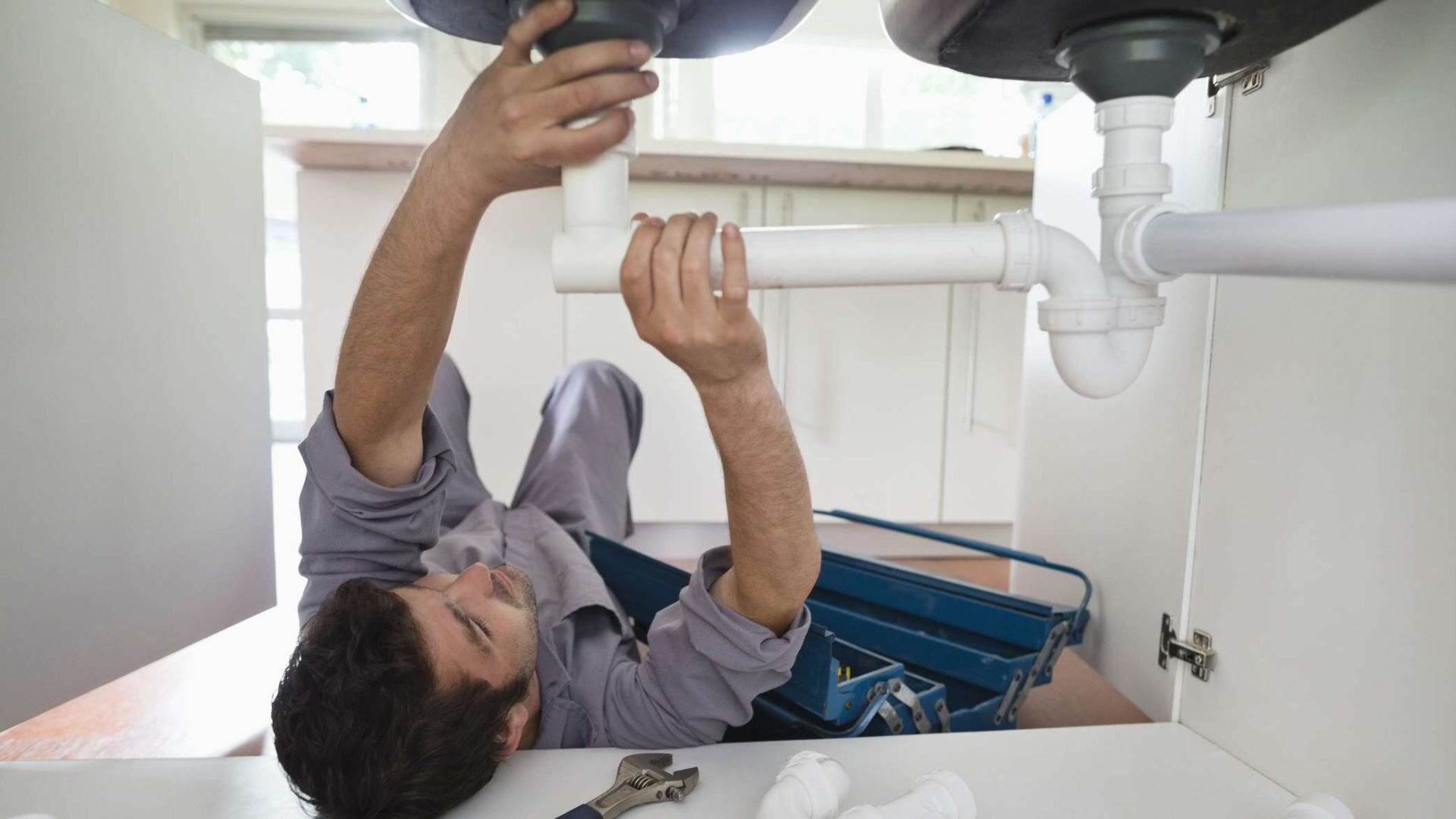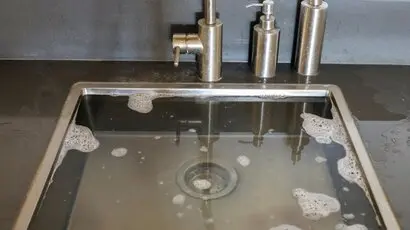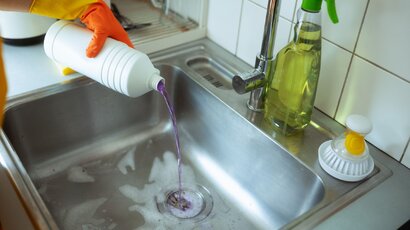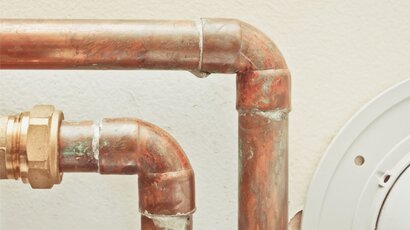No one likes dealing with a blocked kitchen sink. It’s incredibly frustrating to watch water sit there stubbornly while your dishes stack up. Luckily, you don’t always need to call a plumber; some minor clogs are simple enough to handle on your own.
The trick is in figuring out how bad the blockage is and whether you’re equipped to handle it. A straightforward clog might just need a bit of DIY effort with a drain snake. However, if it’s a stubborn or long-term issue, it could be hiding bigger plumbing problems, best left to professionals.
So, how do you figure out if you need just a plunger or a plumber? Let’s explore the factors to consider so you can make the right call.
Understanding Sink Blockages
A lot of kitchen sink clogs happen gradually as grease, food particles, and other gunk build up in the pipes. To help keep things flowing smoothly, flushing your drains with hot water now and then can dissolve and clear away these deposits.
Sudden clogs can happen when unsuitable items sneak down the drain. Things like eggshells, veggie peelings, toys, or even utensils can block it right up. Kids are often the culprits, tossing things down the sink that don’t belong.
![]()
Mineral deposits bonding to interior surfaces over decades in aging plumbing systems indicate a need for professional restoration of drainage linings. Tree roots occasionally penetrate drain lines, requiring extraction to prevent future issues.
Educating all household members is critical to avoiding blockages. Proper grease disposal and not rinsing oily or fibrous food scraps can significantly reduce build-up risk. Addressing any initial cause of a blocked drain also helps before residue hardens or roots become firmly embedded.
Understanding common culprits helps determine the best approach, whether DIY clearing newly stuck debris or enlisting a plumber’s help for persistent or extensive drain problems. Catching blockages early usually allows simpler resolution than long-developing issues. Preventive maintenance through occasional drain cleaning can also help keep kitchen sinks flowing freely.
DIY Solutions For You Kitchen Sink Blockage
Before you ring up the pros for minor blockages, there are a few DIY tricks you can try first. Let’s dive into some handy options:
![]()
Plunging
This is a classic first-line method for drainage problems near the drain outlet. Use a solid rubber plumber’s plunger with a tight suction seal covering the drain. Firmly anchor the plunger head before applying a vigorous, steady pumping action to generate pressure changes. Continue vigorously plunging for several minutes to hopefully dislodge any loose clogs or debris trapped below the surface.
Baking Soda and Vinegar
This chemical reaction technique can help break down grease deposits or biofilm build-up for tub and sink drains. Pour about 1/2 cup of baking soda into the drain to coat the residue. Then, slowly add 1/2 cup of white vinegar (do not premix) and immediately place the drain plug or cover it tightly as the mixture will bubble ferociously.
Allow the fizzy reaction to occur undisturbed for at least 30 minutes before pouring a kettle of boiling water to flush any remaining debris away.
Snaking
Hair or slimy debris winding its way deep into sink traps or bends in drainpipes occasionally requires removing obstructions manually. Utilise a hand-powered drain snake - a tightly coiled, flexible plastic or steel probe attached to an extended handle. Insert carefully into the drain opening and retract slowly while twisting gently to scrape piping interiors without damaging material as you work loose any blockages. Repeat monthly for light fixture maintenance.
Boiling Water
When grease or food particles are being stubborn, pouring a few kettles of boiling water down the drain over time can work wonders in dissolving them and getting things flowing again. But be careful with plastic pipes; too much boiling water can eventually cause damage, so keep an eye on that.
Watch for signs of stress or heat warping before contacting a plumber for professional jetting or lining services on older systems.
Enzyme Drain Cleaners
Avoid harsh chemical drain cleaners; look for enzyme-based cleaners containing specific bacteria selected to break down organic clogging material naturally over 48 hours.
Simply pour the bottle’s contents directly into standing water in a clogged drain, and let the enzymes work, breaking bonds between debris and pipes. Flush thoroughly with water afterwards.
When DIY Solutions Aren’t Enough
If multiple self-remedies have failed to clear blockages, it may be time to call a plumber. Professionals have extensive training, proper protective equipment and specialised tools for handling complex drainage issues.
![]()
Complete Blockages
If water refuses to drain after trying plunging, there is likely a complete obstruction deep within the pipes or a break that needs attention. A plumber can diagnose the specific problem by inserting a camera.
Inaccessible Clogs
If a clog persists post-plunging and seems trapped beyond accessible areas like the U-bend or further along drain lines, self-remedies may be unable to dislodge it without power tools. Complex pipe routing requires expert guidance.
Pipe Material Concerns
For older cast iron, terracotta, or polybutylene piping prone to mineral build-up or cracks, general maintenance by an experienced plumber is wise to locate potential trouble spots before an emergency.
Recurring Issues
Frequent or repeating blockages suggest an ongoing root cause, such as tree roots, ruptured joints, or the need for permanent liner installation rather than constant chemical treatments. Professional evaluation determines the best permanent solution.
Gas or Water Damage
Any flooding, water damage, or smells of sewer gases should be inspected by a plumber immediately for potential leaks or material deterioration that could pose health risks. Don’t endanger yourself with DIY fixes.
No substitute exists for a licensed plumber’s diagnostic abilities and toolset when simpler remedies prove ineffective. Their expertise helps locate stubborn drain problems without risking further costly repairs from well-meaning but unqualified tampering.
The Importance of Promptly Addressing Drain Clogs
Beyond wasting time waiting for a slow drain to clear naturally, failing to address sink clogs promptly can lead to exponentially greater repair costs. As water backs up behind an obstruction, pressure builds on vulnerable joints and connections within walls over time. Months of water pressure increases the risks of cracking or ruptures forming.
Any wall or floor damage from unattended leaks requires thorough remediation that drives up costs. Lingering moisture also invites mould growth risks that compromise indoor air quality and occupants’ health. A burst pipe flooding electrical circuits puts lives in danger from electrocution hazards. Professional replacement and repairs become necessary rather than just clearing the initial clog.
Costs multiply rapidly if long-term structural rot results from untreated water accumulation. Retrofitting plumbing components may also involve repairing drywall, landscaping and more. Yet these compounding expenses could have been avoided by taking an afternoon to fix or engage a technician to clear a simple blockage early on. Ignoring plumbing issues only ensures exponentially worse problems and higher costs in the long run.
The Best Approach To Preventative Measures
The best approach to dealing with blocked sinks is prevention. Here are some tips to keep your drains clear:
- Always scrape plates into the trash or compost before washing.
- Use sink strainers to catch food scraps and other debris.
- Regularly flush your drains with hot water, vinegar, and baking soda mix to keep them running smoothly.
- Avoid pouring oil, grease, or fat down the drain, where they can solidify over time.
- Never put food waste like eggshells, potato peels, or coffee grounds down the garbage disposal or drain.
- Inspect drain traps monthly for build-up so vinegar and baking soda won’t dissolve.
- Pour boiling water down sinks periodically to melt any grease that has accumulated.
- Consider using enzymatic cleaners or drain filters for severely clogged drains.
- Check P-traps under sinks regularly to ensure they haven’t dried out.
- Educate all household members on proper practices to avoid passive blockages.
Know What You Need To Do When Your Kitchen Sink Blocks!
The situation depends on whether a blocked drain requires basic DIY fixes or a technician’s touch. Homeowners should evaluate the severity and location of the clog, attempt less invasive remedies, and know when an issue is beyond their ability or safety to handle alone. Dealing with drainage problems promptly avoids letting minor hassles evolve into much bigger and costlier problems.
If drain woes persist despite efforts or you lack confidence in performing repairs, WP Plumbing should be your first call. As Melbourne’s top plumbing experts, their team can assess issues professionally and get your sink or drains flowing freely once more through reliable techniques. Their licensed technicians have the industry’s latest tools and training to diagnose problems, large or small. Don’t stress over plumbing puzzles. Contact the experienced plumbers at WP Plumbing today for skilled assistance.

